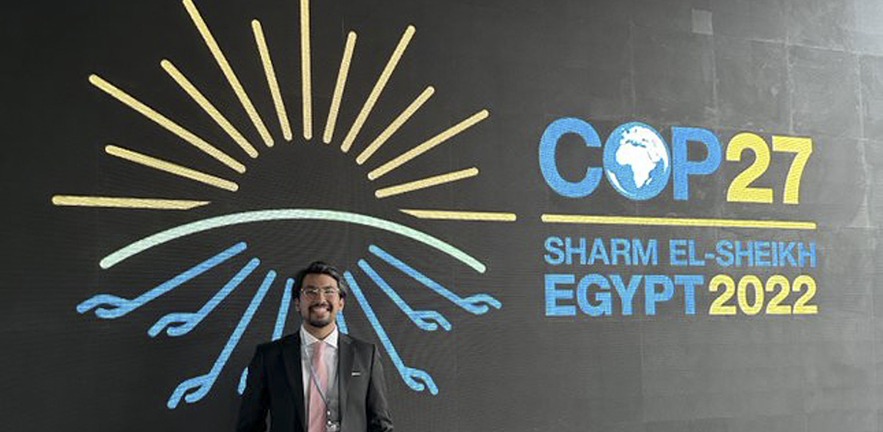Andika Aufar Satria, a Cambridge MBA student at Cambridge Judge Business School, leads a non-profit organisation in Indonesia called the Society of Renewable Energy and has worked on climate engagements as part of the Boston Consulting Group. He is part of Indonesia’s delegation to the COP27 climate summit, and offers his view on the gathering in Egypt.
The COP27 summit in Sharm-el-Sheikh, Egypt, is frequently portrayed as a clash between developing and richer nations, as poorer countries argue that wealthier states should pay more in compensation for damage caused by historical greenhouse gas emissions. This is a pivotal issue, and a meeting in Germany for the 12th Petersburg Climate Change conference this summer underlined a big rich-poor gulf.
Yet the gloom is overstated because COP27 also provides a pivotal opportunity for developing and lower-income nations to help show the way in the transition to clean energy, which is critical for developing states, such as my country Indonesia, to tackle carbon emissions and meet United Nations targets on climate change issues.
Why Indonesia has opportunities from a Just Transition to cleaner energy
Transitioning to inclusive green economies will be hard for developing countries whose living standards are well below western levels. Therefore, the transition must be fair, not only for the environment but also for economic prosperity, social justice, rights, and social protection for all, ensuring no one is left behind. This is called the climate ‘Just Transition’.
As we focus on emerging economies, Just Transition provides important opportunities for a country like Indonesia, a nation of ~17,500 islands that faces an existential challenge from rising seas and other catastrophic effects of climate change. Indonesia ranks as the 7th most vulnerable country to climate change impact and at the same time ranks 8th in its contribution to the world’s greenhouse gas emissions. The climate poses both a risk and an opportunity.
The Ring of Fire: big geothermal supplies can help replace coal
This transition to clean energy will not be painless or risk-free in any country, but risks are mitigated in a nation like Indonesia because we are relatively well positioned for developing renewables with numerous indigenous sources such as geothermal, solar, wind, hydropower, and biofuels. In fact, Indonesia’s projected potential solar power capacity can reach up to ~190 GW and is perfect for filling in the supply gaps around Indonesia’s off-grid areas around the archipelago. Non-profits, governments, and private companies have collaborated to install these off-grid solar powers across the country.
Additionally, Indonesia is in a unique position in helping to lead the coal phaseout, a key focus of COP27. Thanks to our reliable geothermal sources we can more easily replace coal as Indonesia’s baseload power. We are situated in the most active volcanic fault, the Ring of Fire, with an estimated 28GW potential, representing ~30% of global geothermal resources.
Rich natural resources ready for decarbonisation
Indonesia also has massive opportunities for Carbon Capture, Utilisation, and Storage (CCUS) technologies given the massive indigenous gas supplies and relatively mature national industries. There also are substantial opportunities in biogas applications given the country’s footprint in agriculture, while Southeast Asian countries are already helping a transition to hydrogen by expanding hydrogen supply chains; Brunei, for example, has pioneered the supply of liquefied hydrogen to Japan from the port of Muara starting last year.
Why reforms are needed to attract investors
Yet huge challenges remain. Indonesia still needs to catch up in meeting its governmental target of a 23% renewable energy share mix by 2025, with renewables now accounting for 11% of the total. To achieve this improvement in the next three years, around $44.2bn of power generation investment would be needed – and such investment is now held back by stringent local requirements, a monopolised electricity market, and a lack of transparency in project procurement.
These are key issues that should be addressed. For many years, developed countries fell $10bn short on the $100bn per annum investment pledge for developing countries as investors struggled to find attractive climate projects with sufficient return, scale, trust, and information.
My role at COP27 focuses on financing and youth
My role at the COP27 summit includes connecting the dots between potential investors and specific decarbonisation projects in Indonesia on Finance Day on 9 November.
I will also participate in the Youth and Future Generations Day on 10 November, seeking to entice potential investors and donors by sharing the success stories of non-profit solar projects around Indonesia that have proved to be cost-friendly, with participation by indigenous people, such as a solar panel installation project in Karangrejo in Central Java. The role of young people is critical to ensure the climate Just Transition over the course of this decade, as these future leaders will be closest to the ground in implementing initiatives amongst all civil societies.
I am convinced that together we can ensure a Just Transition to a more sustainable world, with developing countries like Indonesia driving rather than riding in the back seat – supported by the developed countries. COP27 is a critical junction for launching such an achievement.


